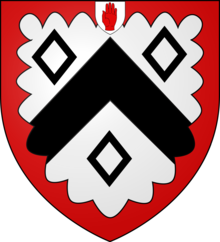Sir Mordaunt Martin, 4th Baronet
| Sir Mordaunt Martin, 4th Baronet | |
|---|---|
| Baronet | |

Coat of arms of the Martins of Long Melford. Argent, a chevron between three mascles Sable within a bordure engrailed Gules. The red hand on an escutcheon signifies the arms of a baronet
|
|
| Spouse(s) | Everilda-Dorothea Smith Catherine Styleman |
|
Issue
Everilda Martin
Mordaunt Martin Anna-Maria Martin Caroline Martin Frances Martin Sir Roger Martin, 5th Baronet Catherine Martin Louisa Martin Sophia Martin |
|
| Noble family | Martin of Long Melford |
| Father | Sir Roger Martin, 3rd Baronet |
| Mother | Sophia Mordaunt |
| Born | 1740 |
| Died | 24 September 1815 |
Sir Mordaunt Martin, 4th Baronet (c. 1740 – 24 September 1815) was son of Sir Roger Martin, 3rd Baronet and Sophia Mordaunt. He inherited his baronetcy from his father, who was the third Martin Baronet, upon his death in 1762. He lived in Burnham Market in Norfolk
Sir Mordaunt was a marshall of the vice admiralty court in Jamaica.
In 1808 he purchased Burnham Westgate Hall, which he built onto. In particular he built a number of farm buildings. A keen agriculturalist, he wrote many letters and articles on the relative benefits of the mangel wurzel as a crop and is documented as the first person to introduce the plant, as well as sainfoin to the county and greatly improved the growth of potatoes and other vegetables. On his death he left the hall-described by White as "a hand-some mansion, beautified with pleasure grounds and shrubberies, and situated near the church", to his son and heir Roger
On 5 August 1765 Sir Mordaunt married Everilda-Dorothea Smith (1743 – 21 September 1800), daughter of the Reverend William Smith rector of Burnham Market and by her had two sons and seven daughters:
Governess to these children from 1775 to 1780 was a very young Jane Arden, the first friend of Mary Wollstonecraft. She later set up a school and published educational works as Jane Gardiner. She named her daughter Everilda, after Lady Martin. Governesses were often isolated and oppressed, but the Martins treated her well – on a return visit, "more as a daughter than as an humble 'gouvernante'". She commented that the family atmosphere was intellectual, refined, and Christian.
Burnham was within visiting distance of Houghton Hall, then in the possession of Horace Walpole; the Martins took their former employee to admire the famous collection of paintings there.
...
Wikipedia
